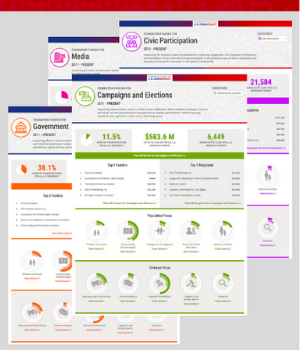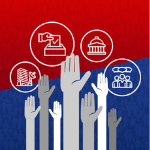Philanthropy and Democracy: Bringing Data to the Debate
As money and politics become increasingly intertwined, the enduring debate around the intersecting roles of philanthropy and democracy has taken on new life in recent months (see here, here, here, and here for prominent examples).
One side of the debate sees the flexibility of foundation dollars as a part of the solution to strengthen struggling democratic institutions. Others contend that foundations are profoundly undemocratic and increasingly powerful institutions that bypass government channels to shape the country–and world–to their will. Regardless of where you stand, a practical starting point is to learn more about what grantmakers are actually doing to affect democracy in these United States.
While foundations are required by law to avoid partisan and candidate campaigning, these limitations still leave plenty of room for foundations to engage with democracy in other ways.
Which funders are working on voter access issues? How much money is dedicated to civic engagement on key issues like health or the environment? Which organizations are receiving grants to increase transparency in government? Foundation Funding for U.S. Democracy, offers a free public resource to get at the answers to such questions.
Browse More Than 55k Democracy Grants
Launched in 2014 by Foundation Center and updated regularly, Foundation Funding for U.S. Democracy’s data tool currently includes over 57,000 grants awarded by more than 6,000 funders totaling $5.1 billion dollars across four major categories: campaigns and elections, civic participation, government strengthening, and media.
The tool offers a look at the big picture through dashboards on each of these categories, and also allows you to browse granular grants-level information. Interested in understanding:
- The largest funders of campaigns and elections work?
- Grantmaking in support of civic participation, broken down by population type?
- The strategies used to affect democracy work?
To paraphrase the slogan of Apple, there’s a dashboard (and underlying data tool) for that!
The site also features a collection of research on U.S. democracy, powered by IssueLab, links to a number of relevant blog posts, and hosts infographics we’ve developed using data from the tool.
What Does the Data Tell Us About Philanthropic Support for Democracy?
 Less than two percent of all philanthropic funding in the United States meets our criteria for democracy funding, which includes efforts by foundations to foster an engaged and informed public and support government accountability and integrity, as well as funding for policy research and advocacy. It’s a modest amount considering that this subset captures a wide range of topics, including money in politics, civic leadership development, civil rights litigation, and journalism training. Some findings from the data rise to the top:
Less than two percent of all philanthropic funding in the United States meets our criteria for democracy funding, which includes efforts by foundations to foster an engaged and informed public and support government accountability and integrity, as well as funding for policy research and advocacy. It’s a modest amount considering that this subset captures a wide range of topics, including money in politics, civic leadership development, civil rights litigation, and journalism training. Some findings from the data rise to the top:
- Funding for campaigns and elections is the smallest of the four major funding categories tracked. While most people might think of elections as the basic mechanism of democracy, this category only constitutes about 12 percent of democracy funding represented in the tool. Civic participation and government each vie for being the largest category with each accounting for about 38 percent of total democracy funding. And relevant media funding accounts for 28 percent. (Note that grants can be counted in multiple categories, so totals exceed 100 percent.)
- Less than a quarter of funding supports policy and advocacy work. While work to affect policy is often considered front and center when discussing philanthropy’s impact on democracy, the data tool reveals that many funders are working to strengthen democracy in other ways. Supporting civics education for youth, bolstering election administration, strengthening platforms for government accountability, or funding investigative journalism appear as examples of grantmaking areas that strengthen democracy, but have less direct implications for public policy.
- Funder interest in the census and the role of media in democracy is increasing. Given the turbulence of the last couple of years in the U.S. political system and amid calls for greater philanthropic involvement in strengthening democracy, what changes have we seen in giving patterns? Well, with the caveat that there is a lag between the time when grants are awarded and when we receive that data (from 990 tax forms or direct reporting by foundations), based on reports added to IssueLab and news items posted on Philanthropy News Digest, we are seeing evidence that funders are rallying around some causes to strengthen democratic institutions, including efforts to ensure representativeness in the 2020 census and support for research on media consumption and digital disinformation.
Why Should Funders be Transparent about Their Democracy Work?
Appeals for data sharing in philanthropy often center around the common good — detailed data helps to inform authentic conversations around who’s funding what, where, among grantmakers, nonprofits, and other stakeholders. But in a field that’s focused on shaping the nature of our democracy and represents funding from both sides of the ideological divide — including, for example, grantmaking in support of the American Legislative Exchange Council (“dedicated to the principles of limited government, free markets and federalism”) alongside grants awarded to organizations like the Center for American Progress (“dedicated to improving the lives of all Americans, through bold, progressive ideas”), democracy funders tend to be especially cautious about publicizing their work and opening themselves up to increased scrutiny and criticism.
But the reality is that foundation opacity undermines credibility and public trust. Precisely because of criticism about the lack of democracy in philanthropy, foundations should demonstrate intentional transparency and show that they are living their values as democracy funders. Foundations also find that, particularly in a space that’s rife with speculation, there’s a benefit to shaping your own narrative and describing what you do in your own words. It may not make you immune to criticism, but it shows that you have nothing to hide.
How Funders Can Actively Engage: Submitting Grants Data
 Grants data in the platform is either reported directly to Foundation Center via our eReporter program or sourced via publicly available 990 tax forms. While we’re able to get our data-eager hands on foundation grants either way, we prefer sourcing them directly from funders as it lends itself to more recent data — particularly valuable in the current, fast-paced ‘democracy in crisis’ era — and more detailed grant descriptions.
Grants data in the platform is either reported directly to Foundation Center via our eReporter program or sourced via publicly available 990 tax forms. While we’re able to get our data-eager hands on foundation grants either way, we prefer sourcing them directly from funders as it lends itself to more recent data — particularly valuable in the current, fast-paced ‘democracy in crisis’ era — and more detailed grant descriptions.
To submit your most recent grants (we’re currently collecting grants awarded in 2017), become an eReporter! Export a list of your most recent grants data in a spreadsheet (all grants – not limited to those relevant to democracy), review the data to make sure there’s no sensitive information and everything is as you’d like it to appear, and email your report to [email protected]. Submit data as often as you’d like, but at least on an annual basis.
Bringing Tangible Details to Abstract Discussions
At Foundation Center, we often tout data’s ability to help guide decision making about funding and general resource allocation. And that’s a great practical use case for the philanthropic data that we collect — whether for human rights, ocean conservation funding, the Sustainable Development Goals, or democracy. At a time of increased foundation scrutiny, this publicly-available platform can also provide some transparency and concrete details to broaden discussions. What have foundations done to strengthen democracy? And how might they best contribute in these politically uncertain times? For examples, look to the data.
Have questions about this resource? Contact us at [email protected].
–Anna Koob





